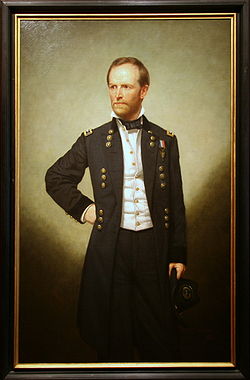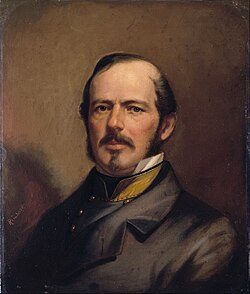 |
| Sherman |
In heavy fighting at Bentonville on March 19th, Johnston's army had won good success, driving back several of Henry Slocum's divisions. But many Federals held firm, and ultimately the Confederates were unable to break the line. The next day was mostly a stalemate. Johnston would not attack again, and remained in a V-shaped line with both flanks anchored on a creek. He reported that he remained on the field so that he could remove his wounded, but he may have also hoped that the Federals would attack him, giving him a better chance for victory. Slocum was heavily reinforced by Sherman, but he too did not attack. There was little more than sporadic fighting throughout the day.
 |
| Mower |
On the 21st Johnston still remained in position, but that day the Federals did attack. Joseph Mower received permission to take his division on a reconnaissance around the Confederate left flank. He took this as an authorization for an attack, and struck nearly in the Confederate rear. That area of the Confederate line was very lightly defended – only a few pickets stood between Mower's men and Johnston's only line of retreat. Confederate General Wade Hampton found one brigade, a battery and a handful of Texas cavalry, and threw them in front of the advancing Federals. They charged and were able to stop the Yankees a few hundred yards from the road. When Sherman heard of Mower's attack, he ordered him back to the main Union line. He later realized this was a mistake, and wrote in his memoirs:
I think I made a mistake there, and should rapidly have followed Mower's lead with the whole of the right wing, which would have brought on a general battle, and it could not have resulted otherwise than successfully to us, by reason of our vastly superior numbers; but at the moment ... I preferred to make junction with Generals Terry and Schofield, before engaging Johnston's army, the strength of which was utterly unknown.
Johnston, having narrowly escaped complete disaster, retreated from the field that night and burned the bridge behind him. He had lost about 2,600 men, 240 killed, 1700 wounded and 675 captured. The Federals lost 194 killed, 1,112 wounded and 221 captured for a total of 1,527. This was one of the last major battles of the Civil War, and the very last that could be claimed as a Confederate victory. Soon after Johnston wrote to Lee, "I can do no more than annoy [Sherman]. I respectfully suggest that it is no longer a question whether you leave present position; you have only to decide where to meet Sherman.” The end was near, and many of the Confederates saw it coming.
 |
| Johnston |






0 comments:
Post a Comment